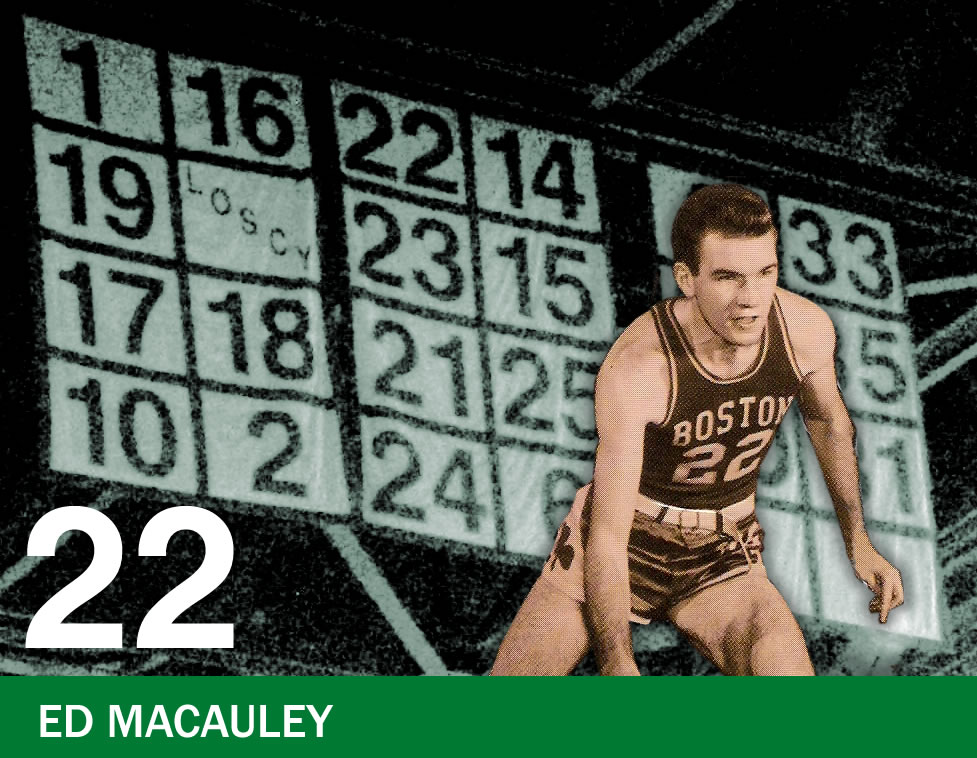From now until February 11, Red’s Army will be posting stories about the players behind the Celtics’ 22 retired numbers and that one retired nickname. Stories will be posted in the order that the numbers were retired.
On October 26, 1963, the Celtics’ home opener against the Baltimore Bullets, the team retired the first two numbers in franchise history.
The second number retired belongs to a Celtic who needs no introduction, and whose profile will be posted tomorrow.
The first? Well, there’s a story to be told about Ed Macauley.
When people talk about the Celtics being a ‘storied’ franchise, they’re basically starting the clock in 1956, when Red Auerbach drafted Bill Russell, Tommy Heinsohn and KC Jones.
In the ten years prior, the Celtics had been occasionally interesting, but that was about it. The star of the league’s first decade was George Mikan, the Minneapolis Lakers’ center. Mikan was the prototypical offense-first center, and Boston’s answer to him was Ed Macauley–a potent scorer (fourth in league history when he retired), but undersized.
Ed was a seven time All-Star and easily the best player on the Boston Celtics in the early 50s. But Red Auerbach knew that the Celtics weren’t going to win championships the way they were constructed. Their defense just wasn’t good enough–especially in the post.
Macauley grew up in St. Louis, attended St. Louis University, and that was still where he made his home in the off-season.
In 1956, the stars aligned. The overlooked University of San Francisco had just won back-to-back NCAA championships as part of a then-record 55 game winning streak. Bill Russell was the star of that team and likely to be the St. Louis Hawks’ pick in the draft. Red Auerbach wanted Bill Russell–and he knew that Russell wasn’t going to come cheap.
Red worked out a deal with St. Louis: Ed Macauley and Cliff Hagan in exchange for Bill Russell.
He took the deal to team owner Walter Brown, and Brown balked. Walter brought Ed into his office, outlined the deal that Red had, and said “I can’t imagine the Celtics without you.”
Ed’s response probably surprised Brown. Ed’s son had contracted spinal meningitis and needed extensive care, “if you make the deal with St. Louis, you’ll be doing me a favor.”
The deal went through and the Celtics went on an unprecedented run, led by Bill Russell.
Macauley never won a title in Boston–but he holds the distinction of playing for the only team to defeat Bill Russell’s Celtics in the NBA Finals.
Shortly after his Hawks lost to the Celtics in the 1960 Finals, Macauley resigned as coach, and was inducted into the basketball Hall of Fame later that year. He still holds the distinction of being the youngest player in the Hall at the time of his induction.
Walter Brown and Red Auerbach knew what Ed had meant to the team in the early 1950s–and they knew that Ed could’ve stopped the trade for Bill Russell if he’d dug his heels in. So a few years after he retired, the team retired his number, 22.
The Celtics’ first star was the team’s first player to have his number retired (and the second player in the league after Bob Davies of the Rochester Royals–now the Sacramento Kings).
“If you’re not practicing, remember, someone somewhere is practicing, and, given roughly equal ability, if you two ever meet, he will win.”
“A lot of players have tremendous confidence in themselves. I never did, not even as a professional ballplayer. I was always fearful of my opponent. As a result, I said to myself, ‘You’re going to have to be prepared because you’re probably not as good as these people,’ and that’s why I spent so much time practicing. I might go out and score 25 points, but I still didn’t have that confidence and felt that I had to continue working.”
(Source for quotations: ESPN.com, Time Present, Time Past)
Ed’s stats at Basketball Reference
Add The Sports Daily to your Google News Feed!
